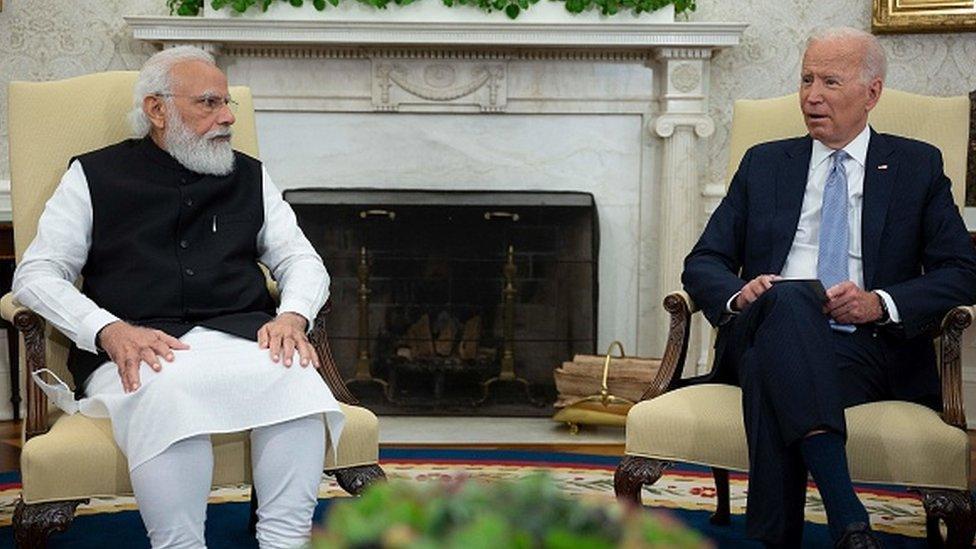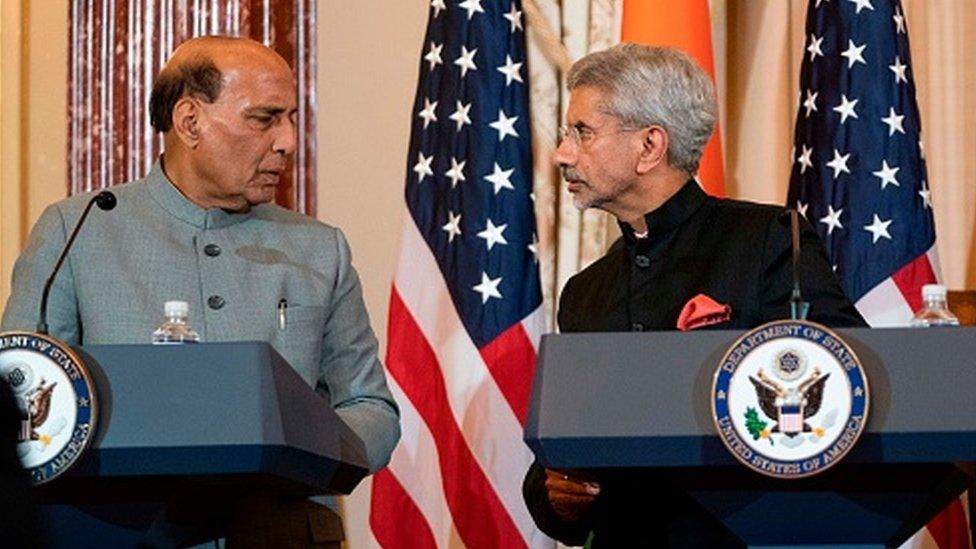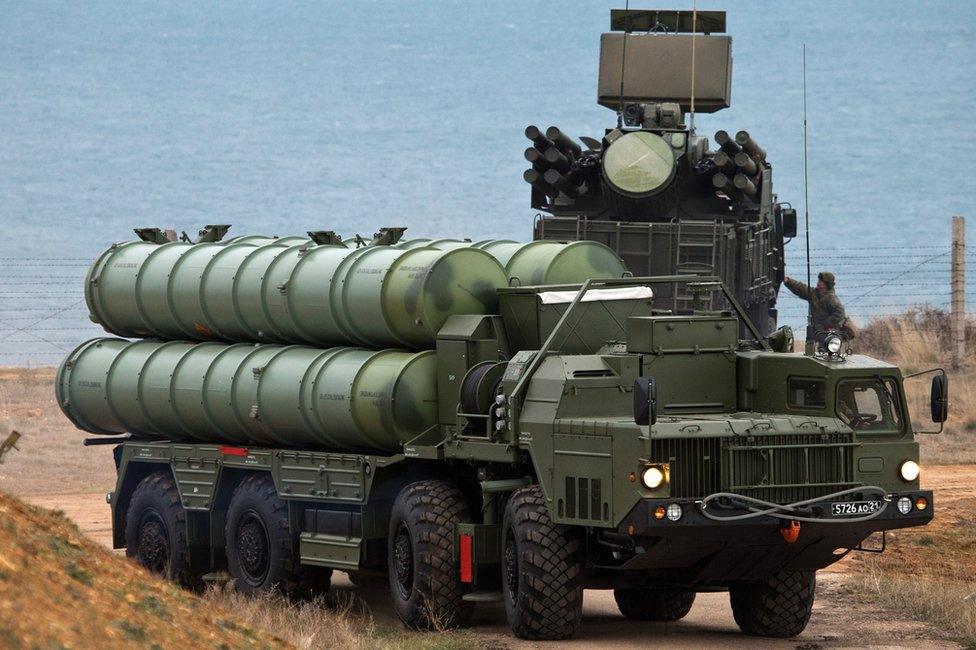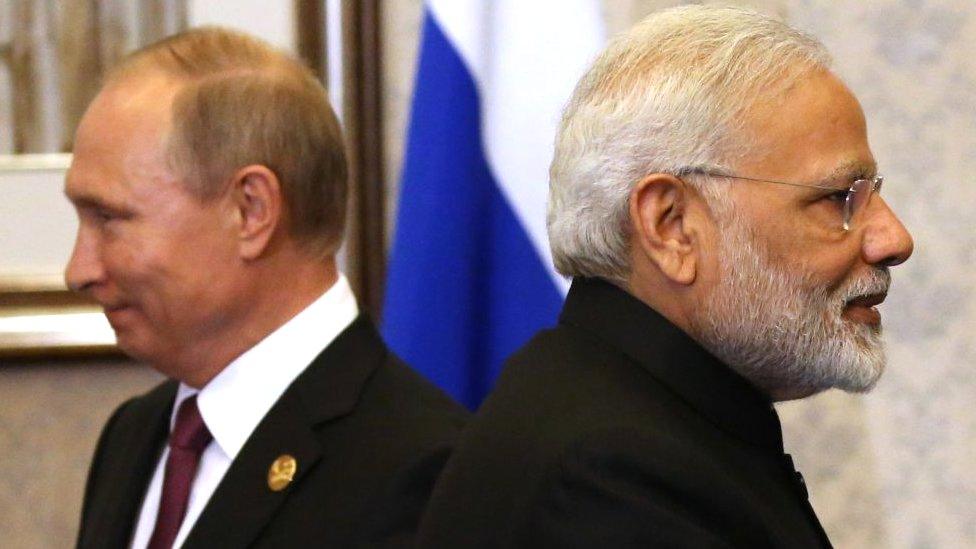2+2 India-US talks: Ukraine looms large over Modi-Biden meeting
- Published

Mr Modi and Mr Biden have talked about strengthening India-US ties (file photo)
Indian Prime Minister Narendra Modi and US President Joe Biden will hold virtual talks on Monday ahead of the meeting between their foreign and defence ministers in Washington.
The ministers' annual meeting - known as the 2+2 Dialogue - was launched in 2018 to deepen co-operation between the two countries.
The forum has focused on improving bilateral relations and co-operation in Asia. It is also seen as part of Washington's strategy to help India become a counterweight to China in the region.
The two nations have largely been on the same page - at least in their public statements - on most issues of mutual concern.
But it's not business as usual this time because of Russia's invasion of Ukraine.
Delhi's press release ahead of the talks included the usual line about strengthening the "comprehensive global strategic partnership" between the two countries.
But Washington's statement mentioned "mitigating the destabilising impacts of Russia's war against Ukraine", suggesting that the US will again nudge India - perhaps not too hard - to take a stronger position on Moscow.

Indian defence minister Rajnath Singh, left, and foreign minister S Jaishankar are in Washington to hold talks
India and the US have had differing views over Ukraine since the war began in February.
While Delhi has used strong words to comment on the invasion, it hasn't directly criticised Moscow. It has also abstained from all UN votes against Russia.
India has also been trying to find ways to circumvent banking sanctions on Moscow to take advantage of discounted oil prices offered by Russian firms.
India's stand of non-alignment also stems from its own geopolitical needs. Moscow is Delhi's time-tested ally and also its largest supplier of defence equipment - accounting for more than 50% of its imports.
Confusion over India's stand
A former Indian diplomat said Delhi's stand has put Washington in a Catch-22 situation.
The US wants India to be part of its wider strategy of isolating Russia but at the same time, it can't afford to weaken India against China - both diplomatically and militarily.
Experts say this has created confusion in the White House about the best way to deal with India.
Washington has not directly criticised India but has issued statements that experts call "mild warnings".

India and the US have had differing views over Ukraine since the war began
After Mr Modi refrained from criticising Russia during a recent meeting of the Quad - which also includes Australia, the US and Japan - on Ukraine, Mr Biden said India's stand on the war was "somewhat shaky"., external
His top economic adviser Brian Deese later said India had been informed that the consequences of a "more explicit strategic alignment" with Moscow would be "significant and long-term".
But this didn't deter India as it once against abstained from the vote that suspended Russia from the UN Human Rights Council.
Other US officials, including US Deputy National Security Adviser for International Economics Daleep Singh, have appeared to be more understanding of India's stand.
What's at stake?
While Mr Biden and Mr Modi are likely to focus on bilateral ties, Ukraine still looms large over the meeting.
It will also be on the agenda when Indian Foreign Minister S Jaishankar and Defence Minister Rajnath Singh meet their US counterparts Antony Blinken and Lloyd Austin on Monday.
Both sides have been clear about their differing stands on Ukraine but there is too much at stake to risk their bilateral relationship.
Washington sees India as an ally to challenge China's dominance in the Asia-Pacific region.
Both countries also believe that there is massive untapped potential in bilateral trade.
They have the ambitious target of taking bilateral trade - which was at $113bn in 2021 - to $500bn in the future.
India also needs the US to help diversify its defence portfolio and reduce its reliance on Russian arms.
Moscow continues to be India's largest arms supplier even though its share has dropped to 49% from 70%. The US was India's second-largest supplier between 2011 and 2015 after Russia, but fell behind France and Israel in the period between 2016 and 2021.

Russia has sold its S-400 anti-aircraft system, seen here in Crimea, to India
Both Washington and Delhi would want to improve on these statistics.
The S-400 deal
But the elephant in the room will continue to be India's purchase of the S-400 missile defence system from Russia - a deal which gives India strategic deterrence against both China and Pakistan.
The agreement has come under the Countering America's Adversaries Through Sanctions Act (Caatsa), which was introduced in 2017 to target Russia, Iran and North Korea with economic and political sanctions. It also prohibits any country from signing defence deals with these nations.
The US had sanctioned China for buying the same system in 2018.
But so far, it has been evasive about doing the same for India. It had refrained from sanctioning India even after the country started receiving the first deliveries of the S-400 in December last year.
But the Ukraine war will now further complicate the situation.
Some US officials have said in the past that there was no guarantee that India would get a waiver.
Now, in the fast-changing geopolitical scenario, both Washington and Delhi would not want to publicly take stands against each other.
But when the defence ministers meet, the S-400 and the issue of sanctions will definitely come up.
How the two countries deal with this and their other differences will determine the future course of Washington-Delhi ties.
- Published3 March 2022

- Published2 March 2022
